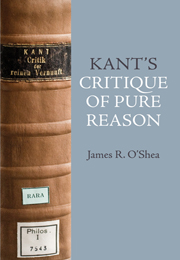Book contents
- Frontmatter
- Contents
- Preface
- INTRODUCTION
- 1 METAPHYSICS AND THE “FIERY TEST OF CRITIQUE”
- 2 WAKING FROM DOGMATIC SLUMBERS: HUME AND THE ANTINOMIES
- 3 SPACE AND TIME AS FORMS OF HUMAN SENSIBILITY
- 4 THE CATEGORIES OF UNDERSTANDING AND THE THINKING SELF
- 5 ONE LAWFUL NATURE
- 6 CONCLUSION: PURE REASON'S ROLE IN KANT'S METAPHYSICS OF NATURE
- Bibliography
- Index
4 - THE CATEGORIES OF UNDERSTANDING AND THE THINKING SELF
- Frontmatter
- Contents
- Preface
- INTRODUCTION
- 1 METAPHYSICS AND THE “FIERY TEST OF CRITIQUE”
- 2 WAKING FROM DOGMATIC SLUMBERS: HUME AND THE ANTINOMIES
- 3 SPACE AND TIME AS FORMS OF HUMAN SENSIBILITY
- 4 THE CATEGORIES OF UNDERSTANDING AND THE THINKING SELF
- 5 ONE LAWFUL NATURE
- 6 CONCLUSION: PURE REASON'S ROLE IN KANT'S METAPHYSICS OF NATURE
- Bibliography
- Index
Summary
To sum this up: the business of the senses is to intuit; that of the understanding, to think. To think, however, is to unite representations in a consciousness.
(Prolegomena, 98=4:304)Now there are only two ways in which a necessary agreement of experience with the concepts of its objects can be thought: either the experience makes these concepts possible or these concepts make the experience possible.
(B166–7)Thus as exaggerated and contradictory as it may sound to say that the understanding is itself the source of the laws of nature, and thus of the formal unity of nature, such an assertion is nevertheless correct and appropriate to the object, namely experience.
(A127)CONCEPTUAL THINKING: THE CATEGORIES AS A PRIORI FORMS OF UNDERSTANDING
The need for a transcendental deduction of the categories
In the previous chapter we examined Kant's novel contention in the Transcendental Aesthetic that even our most basic sensory capacities already presuppose certain pure a priori dimensions of human cognition that are not themselves derived from sensation a posteriori. These are the universal frameworks of space and of time as pure forms of our outer and inner sensory intuition. According to Kant, we human beings can have knowledge of objects only if they are given to us, directly or indirectly, by affecting our receptive faculty of sensibility. The resulting sensory intuitions of objects are immediate and singular presentations of particular objects, such as a visual intuition of the Eiffel Tower from a certain perspective or point of view.
- Type
- Chapter
- Information
- Kant's Critique of Pure ReasonAn Introduction and Interpretation, pp. 116 - 157Publisher: Acumen PublishingPrint publication year: 2011

